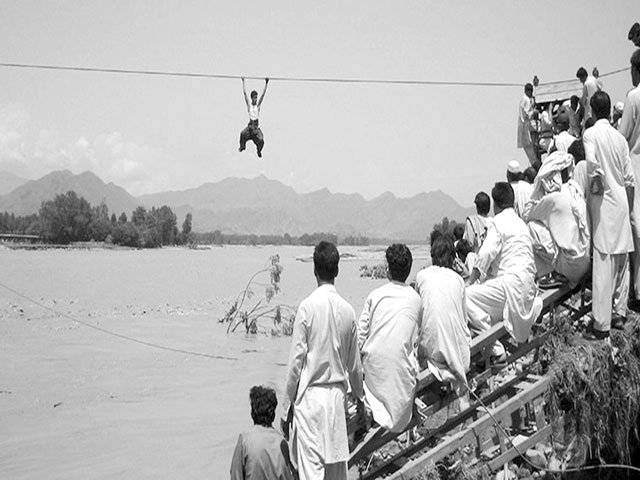In Khyber Pakhtunkhwah, people were already stricken with problems related to terrorism. Now the heavy monsoon rains that have brought a flood of historic sweep and destruction have hit them like nothing before. The provincial capital Peshawar and all near by cities and towns of note including Charsadda, Nowshera, Kohistan, Kohat, Swat, Shangla, Dir, Dera Ismail Khan and Hazara are so badly affected that several dozens of residential areas are ruined completely, leaving hundreds of thousands homeless. Communication system is in total disarray which has caused Peshawar to be completely cut off from many affected regions still under water. According to information received by government until August 5, more than 100 bridges are hung limp from their securing in the shape of wreckages. By one estimate, more than 1600 people have died and 2. 5 million rendered homeless. The entire infrastructure has fallen apart, so to say. After this terrifying destruction, the next thing we come to know is that government is doing nothing, not even the immediate and urgent operations of rescue. This means people are literally left on their own to grapple with scarcity of food, medicines, clothing and even clean drinking water. Since August 4, 2010, further torrents of floods have destroyed some 130 villages around the Peshawar city. During the severe downpour in that week, Peshawar had a blackout of 24 hours and in some of its adjoining rural areas as much as 72 hours. The provincial government had 25, 000 tents in its custody which were provided to the victims. But people affected were in hundreds of thousands so there is need for a permanent solution to this problem. The sewerage system of the city also needs repairs in order to be made effective. I think what the government can do on an immediate basis is to provide heavy machinery so that people could start some bit of reconstruction and rehabilitation that they can do themselves. Clean drinking water should be made available so that outbreak of epidemics can be avoided. The victims are receiving inadequate supply of food even as government and other private organizations have provided them with food items. But the scenes of hungry scavenging for food persist. Nothing we would do can console those who have lost their loved ones, homes, property, cattle, crops, everything. All we can do now is to give them a shelter of coarse cloth to sit under, have a morsel to eat with water they can drink while they mourn the wreckage of their lives. -MARIA GUL, Karachi, September 3.
Friday, April 19, 2024
Khyber Pakhtunkhwa poursin tears

President Zardari confers Nishan-i-Imtiaz (M) award on Turkish CGS
8:23 PM | April 19, 2024
NA speaker suspends two MNAs for disruptive behavior during presidential address
8:20 PM | April 19, 2024
PM Shehbaz orders accelerating countrywide drive against smuggling
8:19 PM | April 19, 2024
LHC allows PTI to hold rally in NA-119
8:18 PM | April 19, 2024
Balochistan cabinet members to be assigned portfolios shortly, says CM Bugti
8:17 PM | April 19, 2024
A Tense Neighbourhood
April 19, 2024
Dubai Underwater
April 19, 2024
X Debate Continues
April 19, 2024
Hepatitis Challenge
April 18, 2024
IMF Predictions
April 18, 2024
Kite tragedy
April 19, 2024
Discipline dilemma
April 19, 2024
Urgent plea
April 19, 2024
Justice denied
April 18, 2024
AI dilemmas unveiled
April 18, 2024
ePaper - Nawaiwaqt
Advertisement
Nawaiwaqt Group | Copyright © 2024





